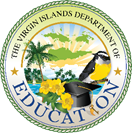Schools will open on a rolling basis as buildings are retrofitted with required fixtures
The Virgin Islands Department of Education will reopen its public-school campuses on a rolling basis throughout the months of February and March using a hybrid instructional model, which will provide in-person instruction to students in grades PreK-3, students with special needs, and students enrolled in Career and Technical Education (CTE) classes. This model also allows for students in grades 4-12 to continue learning from home.
Education Commissioner Racquel Berry-Benjamin made the announcement during the Government House Jan. 14 press briefing, alongside Assistant Commissioner Victor Somme III, and District Superintendents Carlos McGregor and Stefan Jurgen, PhD.
The decision to reopen campuses on a rolling basis, and not on the previously announced date of Jan. 25, has to do with the Territory’s recent spike in COVID-19 cases, as well as lengthy delays in the shipment of critical items needed for schools to safely reopen—namely, automatic soap and hand sanitizer dispensers. As these fixtures arrive and are installed, campuses will reopen.
“Without these items installed in our school buildings, we will not receive the requisite approval from the V.I. Department of Health to return students to our campuses,” Berry-Benjamin said.
While not a requirement of the Centers for Disease Control and Prevention (CDC) to reopen schools, Berry-Benjamin further pointed out that the Department has invested in the installation of hand-washing stations and plexiglass partitions at its schools “in order to ensure a safe, healthy and comfortable learning environment for all students and staff.”
Berry-Benjamin noted that gatherings and travel during the recent holiday season have contributed to an increase in active COVID-19 cases across the Territory, according to the most recent PUI stats released by the V.I. Department of Health.
“The Department of Education has continued to rely heavily on guidance from the V.I. Department of Health as it relates to our operations,” she said. “Let me state empathically—we will always lead with safety first. Governor Bryan has not relaxed the COVID-19 state of emergency and the Territory remains under the Safer-At-Home alert level.”
Hybrid learning will be structured slightly differently in the two school districts when campuses reopen.
St. Croix District
In the St. Croix District, students enrolled in pre-kindergarten through third grade, Special Education (SIE, Self-contained), and second-year Career and Technical Education students will physically return to their school campuses, full-time, five days a week.
Elementary schools will incorporate a staggered return with pre-kindergarten, kindergarten and first grade students returning the first week, followed by second- and third-grade students returning the second week. This will allow students to practice the logistics of social distancing, temperature checks, meal distribution, and other aspects of campus life to ensure compliance, efficiency, and safety.
Fourth through twelfth-grade students who learn in general education settings will continue learning from home. McGregor said options will be evaluated for a safe return to in-person learning for these students in the 2021-2022 school year.
St. Croix parents of students in pre-kindergarten through third grade and Special Education (SIE, Self-contained) may choose for their children to continue learning from home when hybrid rollout begins in February by completing the “In-Person/Remote Learning Request” form available from their child’s teacher.
St. Thomas-St. John District
In the St. Thomas-St. John District, students in PreK-3rd grades, Special Education (Self-contained) and those enrolled in upper-level CTE courses will have the option to return to school for face-to-face instruction.
The population is divided so that all students are not on campus at the same time. Students are grouped into two cohorts – A and B – and will receive in-person interaction with teachers two days per week and distance learning three days per week.
Students in fourth through twelfth grades will continue learning online, from their homes, through the aid of educational platforms, such as Microsoft Teams, Edmentum, Acellus and iReady, and will be guided by a teacher.
Schools in both districts will host a series of reopening orientation sessions to help students and parents become acclimated with the new campus safety protocols and procedures. Busing and meals will also be available to students.
Preparations for the February/March safe return to school campuses are well underway. Signage have been designed and printed indicating new campus safety protocols; adequate supply of hand soap and hand sanitizer is available for all schools; adequate supply of Personal Protective Equipment (PPE) is available for workers requiring these items; adequate supply of infrared thermometers have been distributed to schools; an isolation room has been identified at each school to accommodate students/staff who present symptoms of COVID-19; school bus service is on standby to transport students requiring this service; and COVID-19 training and testing for Food Service Workers, bus drivers and school monitors is ongoing.
Additionally, the Department of Education continues its annual planning to provide extended learning opportunities for students during the summer months.
In her closing remarks, Berry-Benjamin reminded viewers and listeners to remain flexible as the Department continues to respond to the coronavirus pandemic.
“Our teachers, district and school leaders are working around the clock to ensure students are given a quality education under these unique circumstances,” she said. “Some days are better than others, but most days are awesome.”
Berry-Benjamin and the district leaders will be guests on a series of local radio programs the week of Jan. 19-23 to share more about the Department’s plan to reopen campuses safely. The schedule of appearances can be found on the Department’s Facebook page.
Download PDF: pdf DOE Public Schools to Implement Hybrid Learning Feb and March 2021 (157 KB)

